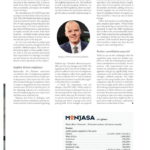For better compliance after the »sulphur cap«, Svend Stenberg Mølholt, Chief Operating Officer of Denmark-based Monjasa group, pleads for integrating the bunker suppliers in control mechanisms. By Michael Meyer
Besides the use of scrubbers or LNG, one solution to the upcoming regulation in 2020 is ultra low sulphur fuel[ds_preview] oil (ULSFO). The expected introduction could have effects on both the supply and demand side of bunkers, Mølholt tells HANSA.For him, there are still a lot of unknowns on the actual specs of the then available ULSFO, i.e. on catalyst fines. »We don’t really know yet, because nobody came out with a firm product saying this is what we will be able to deliver«, Mølholt says. Therefore it is a little difficult to forecast, but obviously a lot will change in the bunkering industry, he adds. For day-to-day operations, there might come up some changes, for example the close monitoring in the transition period, »but other than that, I don’t foresee a lot of bigger issues«.
Talking about strategic decisions of Monjasa, Mølholt emphasizes the most relevant question to be considered is »where do we want to make which products available«? One example is that fuel oil with 3.5% sulphur content will only fit for vessels with scrubbers. So the question is, whether there is a foreseeable demand to make it available in specific locations. »There may be new markets opening up, but as a physical supplier we need more to consider the availability landscape from 2020«, the COO says.
At Monjasa, the decision has not been made yet, as it is still a long time to go. However, there already are dialogues going on with main customers that source 3.5% fuel and work with a scrubber. »Those we need to have a dialogue with«, he explains, taking a look at the commercial side: »As you get closer to 2020, if you sell on spot basis to customers with scrubbers, it is going to be difficult from a capital expenditure point of view to actually commit having a product in store. Because you tie up working capital in a product you may or may not sell.«
At the end of such a dialogue the question may be raised, whether strategic partnerships may be an option. »When the answer to that is yes, then we are more likely to be holding the 3.5% in our locations«, Mølholt explains. A potential partner for a strategic cooperation may be another physical supplier or an oil major.
Currently, Monjasa has no plans to offer LNG as alternative fuel. However, if there is enough demand, then this might change. But for Mølholt, this is more a niche, with only a few per cent in the global market: »If you look at the price and the infrastructure today and again if you look at the customer side, if you exclude those that are using LNG because they are already carrying it, the market is not very big.«
The introduction of ULSFO may have an impact on the bunker infrastructure as well. The COO thinks that there are going to be less bunker locations. His argument: If 0.5% fuel is going to be produced in less locations than 3.5% fuel is produced today, that will likely mean a concentration of supply around the world, with fewer locations – probably in the current main hubs and main refinery locations. But no one has put a pin in the map yet.
»In our view and what we understand from market research, enough fuel will be available«, Mølholt argues. This can be understood as reply to some market observers, who in the past months announced their expectation of a shortage of compliant fuel. However, the oil and bunker industry is more optimistic in this respect.
Supplier-driven compliance
Repeatedly, the Monjasa executives voiced their idea of integrating suppliers in the control mechanism for compliance of shipowners. One reason for this is the often claimed failing of compliance when it comes to regulation for new emission control areas (ECAs) in the last years. In the shipping industry it is well known that the monitoring was not really strict and fines were relatively low.
Monjasa has been in dialogue with Danish maritime authorities and the national ministry of environment regarding this already. In these talks it has been suggested to further integrate bunker suppliers in global regulation, too. The feedback is said to be encouraging. However, »as with any IMO regulation, there is a start-up time of about two years from when you get the idea to actually implementing it«, Mølholt says. Therefore, there most probably won’t be any changes until 2020. The regulation does not call for bunker suppliers to adhere to any sort of compliance or due diligence other than supply what has been ordered. If 3.5% fuel is ordered, shipowners just have to notify the supplier that they have a scrubber.
»I think the regulations will not change«, the COO adds. »What maybe is more interesting is a dialogue that we are also having with the shipowners and charterers, those who pay the bunkers. Larger owners obviously have an interest in making sure that it is going to be a level playing field. If, for example, we required documentation from them to make sure they are compliant, because they start doing what I call a demand driven compliance, then it more quickly will spread in the market«, he thinks, adding »if we as a bunker supplier say, we need that document of compliance before we supply you, that would be a very easy way of monitoring.«
Other driving forces could be big shippers, retailers and traders. »What if they start asking the big carriers for their commitment to meet the IMO regulations due to their own environmental standards? Then it may become a demand driven compliance all the way from the end customer. That would be interesting and that would be a faster way than the one via port states and flag states.«
Bunker consolidation expected
With an eye on the challenges that the regulation may create for bunker suppliers as well, the Danish group expects some consolidation in its market, for two reasons. »The requirements from customers on compliance and quality management will go up significantly. Some companies may not be able to adjust fast enough«, Mølholt explains. The other aspect is the rising bunker price. Bunker companies who do not have a solid balance sheet might not be able to establish the working capital requirements to drive a business in 2020. However, he emphasizes that this does not mean that Monjasa is going to take over other companies. It just means that they might be able to grow more with customers, »and maybe a bit faster on the back of that«.
Michael Meyer






















